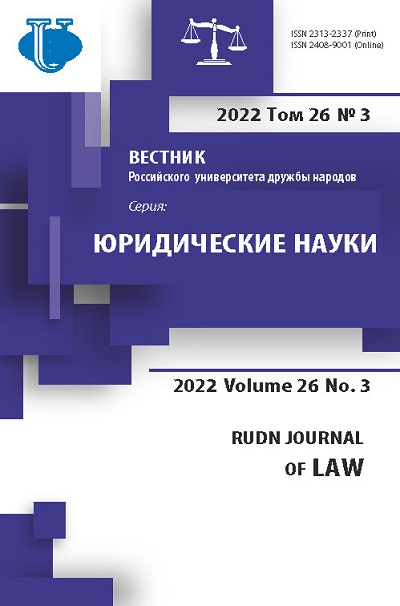Evolution of legal understanding in Western philosophy
- Authors: Zyryanov A.V.1, Babenko A.N.2
-
Affiliations:
- South Ural State University
- The third arbitration appeal court
- Issue: Vol 26, No 3 (2022)
- Pages: 564-581
- Section: STATE AND LAW IN CONTEMPORARY WORLD
- URL: https://journals.rudn.ru/law/article/view/31830
- DOI: https://doi.org/10.22363/2313-2337-2022-26-3-564-581
- ID: 31830
Cite item
Full Text
Abstract
The article is devoted to the analysis of research approaches to legal understanding in Western philosophy, starting from the ancient Greek period and ending with the second half of the 20th century. The aim of the work is to form a comprehensive understanding of the historically changing types of comprehending law (including, such areas as naturalism, moralism, traditionalism, normativism, positivism, sociologism, and realism) revealed in three aspects: formation factors, essence and criticism. The work was carried out within the framework of the modern scientific paradigm, which implies taking into account the plurality, complementarity and interdisciplinarity of approaches to the study of the surrounding world. In the context of evolution methodology, attention is drawn to the conditions of diversity, «heredity» and «mutation» of existing and existed types of philosophical views regarding the nature and essence of law. As a result of the study of the legal positions of such thinkers as Plato, Aristotle, Cicero, Thomas Aquinas, Grotius, Suarez, Pufendorf, Coke, Hale, Blackstone, Hobbes, Bentham, Kant, Austin, Kelsen, Hart, Raz, Dworkin, Fennis, Ross, and Llewellyn, an attempt was made to demonstrate the evolution of philosophical reflection on the factorial transformation of social and state reality, which contributes to “stitching of matter” of Western ideas about legal reality. The area of research implication correlates with the range of interests of scientists and professional subjects of the political and legal sphere interested in objectifying knowledge about the traditional foundations of European legal understanding, which manifest themselves in modern law enforcement practice. It can be concluded that the emergence of philosophy of law paradigms, which signifies “adaptation” to the challenges of the modern era, will ultimately determine how law and legal institutions will be understood and developed in the future.
About the authors
Aleksey V. Zyryanov
South Ural State University
Author for correspondence.
Email: zav-nauka@mail.ru
ORCID iD: 0000-0002-6364-1812
Candidate of Legal Sciences, Associate Professor, Department of Theory of State and Law, Law Institute
76 Lenina Avenue, Chelyabinsk, 454080, Russian FederationAndrey N. Babenko
The third arbitration appeal court
Email: babenkodoc@mail.ru
Doctor of Legal Sciences, Full Professor, Judge 9 Prospekt Mira, Krasnoyarsk, 660049, Russian Federation
References
- Bentham, J. (2000) An Introduction to the Principles of Morals and Legislation. Kitchener, Batoche Books.
- Blackburn, S. (2009) The Big Questions: Philosophy. Toronto, Quercus.
- Blackstone, W. (2003) Blackstone's Commentaries on the Laws of England. London, The Lawbook Exchange.
- Cicero, M. (2009) The Republic and The Laws. Oxford, Oxford University Press.
- Dworkin, R. (1986) Law’s Empire. Harvard, Belknap Press of Harvard University Press.
- Finnis, J. (2011) Natural Law and Natural Rights. Oxford, Oxford University Press.
- Hart, H.L.A. (2012) Тhe concept of law. Oxford, Oxford University Press.
- Hobbes, T. (2011) Leviathan. South Carolina, CreateSpace Independent Publishing Platform.
- Kelsen, H. (1934) Die philosophischen Grundlagen der Naturrechtslehre und des Rechtspositivismus. Bonn, Matthias Jestaedt.
- Llewellyn, K. (1962) Jurisprudence; realism in theory and practice. Chicago, The University of Chicago Press.
- Plato. (2010) Dialogues. New York, Simon & Schuster.
- Ross, A. (2020) On Law and Justice. Oxford, Oxford University Press.
- Searle, J. (2010) Making the Social World: The Structure of Human Civilization. Oxford, Oxford University Press.
Supplementary files















